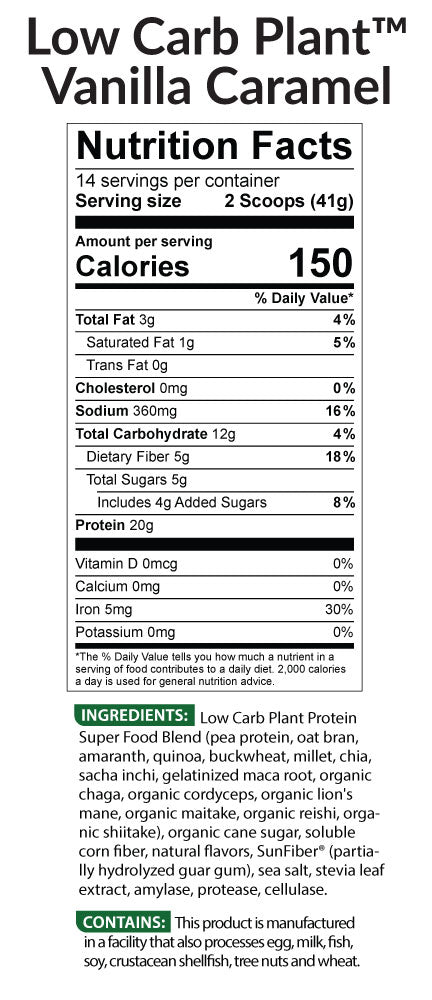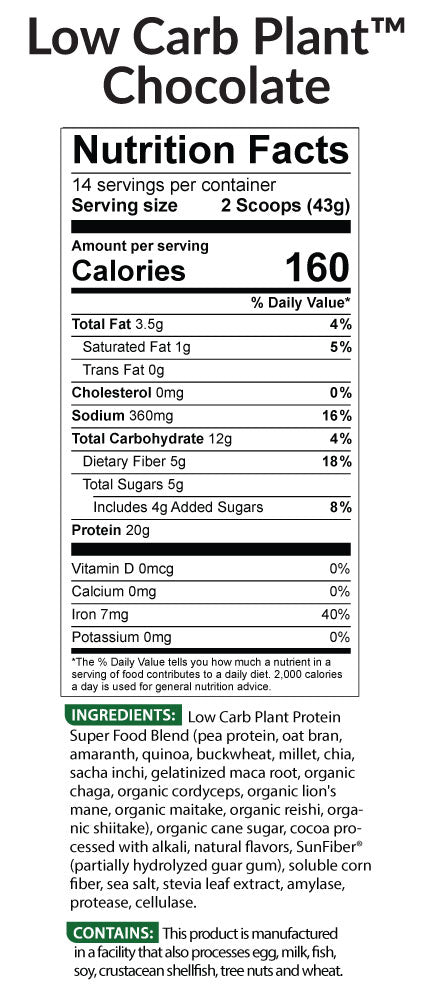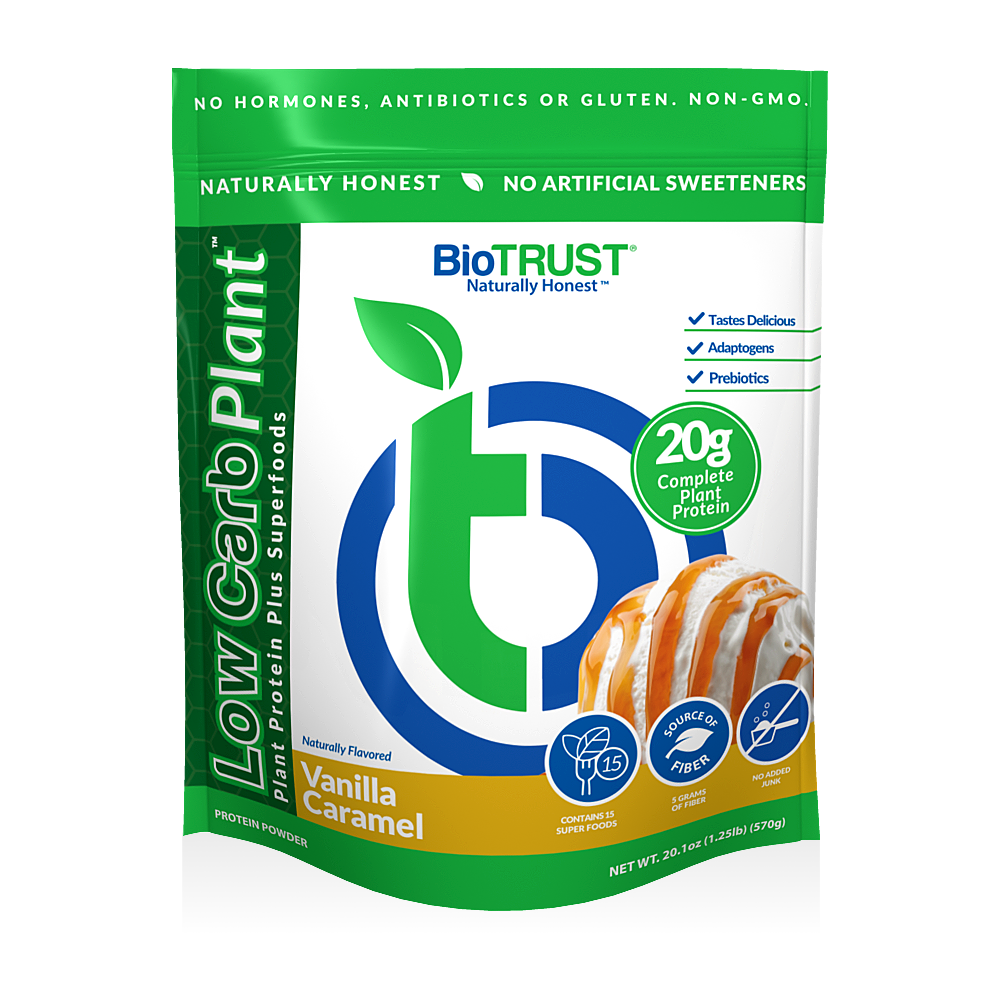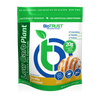BioTRUST Low Carb Plant™ — Plant Protein Plus Superfoods (2 Delicious Flavors)
BioTRUST Low Carb Plant™ — Plant Protein Plus Superfoods (2 Delicious Flavors)
Build your bundle:
60-Day Money-Back Guarantee
Build your bundle:
60-Day Money-Back Guarantee
PHOTOS FROM THE #biotrust COMMUNITY
BioTRUST Low Carb Plant™ — Plant Protein Plus Superfoods (2 Delicious Flavors)
Pricing Options
One-Time Purchase Options
Single Package
Unit Price: $49.0 Total Price: $49.0 for 1 Bag3-Package Bundle
Unit Price: $44.0 Total Price: $132.0 for 3 Bags You Save: $15.0 (10% OFF)6-Package Bundle (Best Value)
Unit Price: $39.0 Total Price: $234.0 for 6 Bags You Save: $60.0 (20% OFF) MOST POPULAR - BEST VALUESubscribe & Save Options
Subscribe: Delivery every 1 month
Unit Price: $29.4 Total Price: $29.4 for 1 Bag Additional Savings vs One-Time: $19.6 (40% extra) FREE SHIPPING on all subscription ordersSubscribe: Delivery every 3 months
Unit Price: $26.95 Total Price: $80.85 for 3 Bags Additional Savings vs One-Time: $51.15 (39% extra) FREE SHIPPING on all subscription ordersSubscribe: Delivery every 6 months
Unit Price: $24.5 Total Price: $147.0 for 6 Bags Additional Savings vs One-Time: $87.0 (37% extra) FREE SHIPPING on all subscription ordersSubscription Benefits
- Free shipping on all subscription orders
- Cancel or modify anytime
- Available frequencies: Delivery every 1 month, Delivery every 2 months, Delivery every 3 months, Delivery every 4 months, Delivery every 5 months, Delivery every 6 months, Delivery every 4 weeks
- Priority customer support
- Never run out of your favorite products
Key Features and Benefits
- COMPLETE PLANT PROTEIN FOR EVERYONE
- 60-Day Money Back Guarantee
- GMP Certified Manufacturing
- Third-Party Tested for Purity
- Made in the USA
Product Summary
BioTRUST Low Carb Plant™ — Plant Protein Plus Superfoods (2 Delicious Flavors) is available for purchase at $49.0 per Bag. The product is currently in stock and typically ships within 1-2 business days. Customers can save more by purchasing multiple packages: Buy 3 packages at $44.0 each (save 10%), or buy 6 packages for the best value at $39.0 each (save 20%) . Subscribe & Save customers receive additional discounts plus FREE SHIPPING on all subscription orders. Subscription frequencies available include: Delivery every 1 month, Delivery every 2 months, Delivery every 3 months, . All purchases are backed by our 60-day money-back guarantee. If you're not completely satisfied, return the product for a full refund. For customer support, call 1-800-766-5086 (Monday-Friday, 8am-9pm CT) or email support@biotrust.com.
Frequently Asked Questions
- What is the price of BioTRUST Low Carb Plant™ — Plant Protein Plus Superfoods (2 Delicious Flavors)?
- The price is $49.0 for a single Bag. Bulk discounts are available: 3-pack at $44.0 each, 6-pack at $39.0 each.
- Is BioTRUST Low Carb Plant™ — Plant Protein Plus Superfoods (2 Delicious Flavors) in stock?
- Yes, BioTRUST Low Carb Plant™ — Plant Protein Plus Superfoods (2 Delicious Flavors) is currently in stock and ready to ship.
- How much does shipping cost?
- Shipping is free for Subscribe & Save orders. Standard shipping rates apply for one-time purchases (typically $4.95-$9.95 depending on location).
- What is your return policy?
- We offer a 60-day money-back guarantee on all products. If you're not satisfied, return the product for a full refund.
- How do I contact customer service?
- Call 1-800-766-5086 (Mon-Fri, 8am-9pm CT) or email support@biotrust.com
Clean, Complete Plant Protein Powder for EVERYONE
- Delicious plant-based protein shake mixes up smooth and creamy
- 20 grams of clean, complete, high-quality protein from pea and Sacha Inchi
- Good source of fiber with 5 grams per serving
- Loaded with 15 superfoods, including an array of organic mushroom extracts
- Formulated with digestive enzymes to assist with digestibility and absorption
- Third-party tested for major allergens, pesticides, glyphosate, heavy metals, microbes, and potency
- Non-GMO, gluten-free, soy-free, and dairy-free vegan protein powder

60-Day Money Back Guarantee

Dairy, Gluten & Soy Free

5g of Fiber Per Serving

No Artificial Sweeteners
Why High-Protein PLUS a High-Plant Diet Is Where It’s At
A higher protein diet works like gangbusters for helping folks look, feel, and move better—and to live a long time doing so. As a matter of fact, while many diet trends come and go, the research on higher-protein diets continues to mount, providing compelling evidence that it can be a very useful tool for promoting…
- Healthy appetite management
- Healthy weight management and healthy body composition, particularly when combined with regular exercise
- Metabolic wellness
- Healthy aging, especially combined with an active lifestyle that involves lifting some heavy stuff (i.e., strength training) a couple times a week
Higher protein diets seem to be especially important for athletes, folks looking to stay fit as they add more candles to their birthday cakes, and really, anyone who’s interested in looking, feeling, and moving better.
The trouble is that it can be tough to consistently get enough protein through food alone. After all, the most recent research suggests that a range of 0.7 – 0.9 grams of protein per pound of bodyweight might be the sweet spot for the myriad benefits mentioned above. To put it into perspective, that’s roughly 120 – 180 grams of protein per day for the average American.
And it can be especially difficult to consistently nail that all-important daily protein target if you’re a busy parent and/or professional, a plant-based eater, or someone who’s into aging gracefully. Speaking of which, as we get older, our protein sweet spot is actually higher (i.e., we need even more protein as we age), yet our appetites decrease, putting us at a greater risk for not hitting our target, which can be even more detrimental as we get older.
As awesome as higher-protein diets can be, there’s arguably an even more important and beneficial combo: A high-protein plus high-plant diet.
For example, there’s emerging research showing that a diet that’s higher in protein and fiber may be the way to go for building and maintaining muscle as we get older. Without getting too thick into the weeds, this likely stems from the profound impact that dietary fiber can have on the gut microflora (e.g., healthy balance of gut bacteria) and its production of the all-important short-chain fatty acids (e.g., butyrate), which promote optimal health in a variety of ways, such as supporting a healthy systemic inflammatory response.
Unfortunately, when it comes to fiber, less than 10% of Americans get enough, and on average, Americans get only 1/3 of the recommended amount.
There’s much more to the plant story than fiber, of course. For instance, plant-based foods can be a great place to find vitamins and minerals, but perhaps even more exciting, plants are chockful of phytonutrients (e.g., polyphenols), which can benefit the body in a variety of ways, such as supporting the body’s natural antioxidant, detoxification, and longevity pathways.
It’s little wonder that diets higher in plants—even if they’re not completely plant-based—tend to be highly recommended by researchers and health organizations. For example, some of the most commonly-used measures of dietary quality (such as the Alternative Healthy Eating Index), which place an emphasis on higher consumption of plant-based foods (but not necessarily vegetarian or vegan diets exclusively), strongly correlate with better health outcomes and longevity.
The bottom line is that eating a high-protein plus high-plant diet is a good marching order for the majority of folks who want to look and feel their best and live a long time doing it.
Why a GOOD Plant-Based Protein Powder Is for All Diets
And if you’re not already vegan or vegetarian, the good news is you don’t have to completely overhaul your entire diet to reap the rewards of a plant-based diet. For example, swapping plant-based protein for animal-based protein (e.g., meat) at just a meal or two can make a difference.
In other words, a flexitarian-style approach may be the way to go for the majority of folks. Said differently, you can have your cake and eat it too. Better said, you can have your meat and potatoes and eat it too… as long as you sub plant-based protein for animal protein every once in a while, say, for 1 or 2 meals per day (i.e., about 20 – 40 grams of protein per day).
Some of the benefits associated with substituting plant-based proteins for animal protein include supporting:
- Healthy lipid levels, including LDL, non-HDL, and apolipoprotein B levels
- A healthy systemic inflammatory response
- Metabolic wellness, including maintaining healthy blood sugar levels
Over the long haul, research suggests that this type of dietary swap (more plant-based protein, less animal protein) may help support:
- Heart health
- Metabolic wellness
- Digestive health
- Healthy aging
- Overall health
The tricky thing, however, is actually getting more plant-based protein in your diet. Unlike many animal foods, plants aren’t typically a great source of protein. In other words, they’re not as highly concentrated in protein, especially high-quality protein. Generally speaking, plants offer more carbs than protein. That ultimately means you typically pay a price—in terms of carbs and calories—for the protein.
For example, here’s the “cost” of getting 20 grams of protein from some of the most common sources of plant protein:
- Tofu: 180 calories, 12g fat, 5g net carbs
- Chickpeas: 360 calories, 44g net carbs
- Pumpkin seeds: 475 calories, 37g net carbs, 20g fat
- Peanuts: 490 calories, 42g fat, 11g net carbs
- Lentils: 260 calories, 27g net carbs
Beyond that, plant-based protein can be challenging for the human body to “access,” as plants can package nutrients like protein in storage units that the human body is not equipped to tap into. In other words, plant-based protein is not always highly digestible. And if the body can’t digest it, it can’t absorb it and reap the benefits.
The take-home point is that we need to eat more protein, and we need to eat more plants, but it can be very challenging to hit the protein sweet spot by eating more plant-based foods alone. So, where does that leave us? Supplementing with a plant-based protein powder, of course!
The Problem with Some Plant Protein Powders
When we went looking for the best plant protein powder, we came up with several important criteria for our search…
- Finding a plant-based protein powder that tastes great. The majority of people aren’t going to consistently use a vegan protein powder if they don’t like the taste. And let’s face it, when it comes to getting results, consistency is king. In other words, you’ve got to like something to use it regularly, which is essential to tapping into the benefits. Sadly, it’s not uncommon for vegan protein powders to leave a lot to be desired in terms of taste, with some described as foul-tasting, chalky, bitter, and/or gritty.
- Finding a plant protein powder that’s a high-quality source of protein. Plant-based sources of protein often lack a full contingent of the essential amino acids (EAAs), which are amino acids the body can’t make on its own and which we must get from our diets. To fully reap the benefits of a higher-protein diet, it’s important to make sure you’re consuming an optimal amount of high-quality protein.
- Finding a plant-based protein shake that’s also highly digestible. Plant-based protein can be challenging for the digestive system to “access,” as plants package nutrients such as protein in storage units that the human body is not fully equipped to unlock. In other words, plant-based protein is not always highly digestible. And if the body can’t digest it, it can’t absorb it. It’s not just “You are what you eat,” it’s more like, “You are what you absorb.”
- Finding a vegan protein powder that’s more than just protein. Yes, plant-based protein is awesome and the majority of us could use more in our diets, but there’s much more to plants than protein. Fiber, for one, is a HUGE reason to eat more plant-based foods. After all, research shows that higher fiber intakes—at least 25 – 29 grams per day—can help promote heart health, digestive health, metabolic wellness, weight management, and even longevity.
Even more, plants are chockful of phytonutrients, which can benefit the body in a variety of ways (through, for example, a process known as xenohormesis), such as supporting the body’s natural antioxidant, detoxification, and longevity pathways. Along those lines, there are SO many phytonutrient-rich plant-based superfoods, and a plant protein powder seems like an ideal vehicle to get more into your diet. - Finding a plant-based protein powder that’s clean. It’s not enough to have a non-GMO, vegan, dairy-free plant-based protein. It also needs to be gluten- and soy-free and free from artificial sweeteners, flavors, and colors. And if you want a clean plant protein powder, you also want to make sure it’s third-party tested for other major allergens as well as pesticides, glyphosate, heavy metals, and microbes (including yeasts and molds).
Yes, we set the bar high, and as you might imagine, we had a hard time finding a vegan protein powder that checked all those boxes.
Why BioTRUST Low Carb Plant Is the Right Plant Protein Powder for You
It's not all bad news because, with an understanding of those hurdles, we set out to create what we believe to be the premier plant protein powder.
- BioTRUST Low Carb Plant tastes GREAT! Look, there’s little to no point in formulating a plant protein powder if it tastes like cardboard and has the mouthfeel of sandpaper. With Low Carb Plant protein powder, our goal was simple: To deliver a clean, complete plant-based protein that tastes great—so good, in fact, that you look forward to drinking it. And we feel like we hit the nail on the head. Low Carb Plant is smooth and creamy, and it tastes delicious—with no added junk or fillers. Plus, it comes in two great-tasting flavors (Chocolate and Vanilla Caramel). The crazy thing is that Low Carb Plant has such an amazing taste and texture with no added gums or creamers. And, it's naturally sweetened (with no artificial sweeteners).
- BioTRUST Low Carb Plant is a high-quality source of protein. Low Carb Plant is a complete protein, with each serving of Low Carb Plant featuring 20 grams of high-quality protein from pea and Sacha Inchi to help power your active lifestyle. Low Carb Plant protein supplies an excellent array of amino acids, including all the EAAs and high levels of the Branched Chain Amino Acids (i.e., leucine, isoleucine, and valine). It’s also particularly high in the amino acids arginine, glycine, and phenylalanine. The well-balanced amino acid profile of Low Carb Plant fulfills the essential amino acid requirements outlined by the World Health Organization for adults (i.e., it is a complete source of protein).
- BioTRUST Low Carb Plant protein powder was formulated to be highly digestible. Low Carb Plant protein powder is not only formulated with highly digestible pea and Sacha Inchi protein, it also features a blend of digestive enzymes to assist with proper digestion and absorption, including:
- Protease to assist with proper protein digestion
- Amylase to assist with proper carbohydrate digestion
- Cellulase, an enzyme that humans don’t produce, to assist with difficult-to-digest plant fibers and help unlock the energy from plants
Additionally, plant-based protein powders have traditionally been considered to be lower quality and have less of a muscle-building effect than animal proteins (e.g., whey) due to their lower digestibility and lower essential amino acid content (especially leucine). However, research has shown that the addition of digestive enzymes may improve the quality of plant-based proteins by increasing levels of amino acids available for absorption.
- BioTRUST Low Carb Plant is more than just protein. If Low Carb Plant was just a clean, complete plant protein powder that wasn’t gritty and didn’t taste like dirt, it would still be a winner. But there’s much more to Low Carb Plant. Because, after all, there’s much more to the plant story than protein. That’s why, for example, each serving of Low Carb Plant packs 5 grams of fiber, making it a good source of fiber. After all, fiber is a big reason to eat more plant-based foods, as both observational studies and clinical trials show that higher fiber intakes—at least 25 – 29 grams per day—promote heart health, digestive health, healthy weight management, metabolic wellness, and even longevity. What’s more, Low Carb Plant protein powder is loaded with superfoods—15 of them, as a matter of fact—including:
- Pea
- Oat
- Amaranth
- Quinoa
- Buckwheat
- Millet
- Chia
- Sacha Inchi
- Maca
- Organic Chaga
- Organic Cordyceps
- Organic Lion’s Mane
- Organic Maitake
- Organic Reishi
- Organic Shiitake
- BioTRUST Low Carb Plant is CLEAN. Now, if all that wasn’t enough, Low Carb Plant is, of course, vegan. It’s also non-GMO, gluten-free, soy-free, and dairy-free. Plus, it's naturally sweetened and free from artificial sweeteners and colors.
Not only is Low Carb Plant made in a GMP-certified manufacturing facility, it’s also third-party tested for major allergens, pesticides, glyphosate, heavy metals, microbes (including yeasts and molds), and of course, potency. So you can be certain that what’s on the label is in the bag—nothing more, nothing less.
Every time you choose Low Carb Plant, you can feel good about fueling your body with clean plant-based protein that has what your body needs—and nothing it doesn’t.
The bottom line is that Low Carb Plant is a clean, complete plant-based protein (with some additional support from Mother Nature) that tastes great and provides a complete amino acid profile to help support an active lifestyle, healthy eating habits, and muscle health/strength. Or, you can think of it this way: Plant Protein with Superfood Power!
Ways to Use BioTRUST Low Carb Plant Protein
If all that wasn’t enough, we think you’ll be delighted when you find out how easy it is to add this delicious-tasting plant-based protein powder into your healthy eating plan. It’s as simple as 1, 2, 3…
- Start with 8 – 12 ounces of water or any cold liquid, such as your favorite non-dairy milk alternative.
- Add two scoops of Low Carb Plant protein powder.
- Shake (or blend) it like you mean it, and mix until smooth. [For best results, use a shaker bottle or blender.]
Here’s the most important part: Enjoy your creamy, delicious plant-based protein shake and feel good about nourishing your mind and body with goodness as Mother Nature intended.
Whether you’re mixing up a post-workout plant-based recovery shake, adding some wholesome protein to your morning smoothie, or powering through afternoon cravings and energy slumps, Low Carb Plant—with all its plant-based superpowers—is something you’ll looking forward to drinking.


California's Proposition 65
Q: What specifically makes BioTRUST Low Carb Plant the right choice for a plant-based protein powder?
BioTRUST Low Carb Plant is a great-tasting, grit-free vegan protein powder that combines some of the world’s most wonderful plant-based protein sources and superfoods to help fuel an active lifestyle. It is non-GMO, and it’s gluten-free, soy-free, and dairy-free. It’s naturally sweetened, and it is free from artificial sweeteners, and colors.
Each smooth, creamy, and delicious serving of BioTRUST Low Carb Plant nourishes the body with 20 grams of clean, high-quality, complete plant-based protein, 5 grams of fiber, and an array of digestive enzymes to help assist with proper digestion. Like all BioTRUST products, Low Carb Plant is third-party tested to ensure purity and potency. Simply put, BioTRUST Low Carb Plant is wholesome plant-based yumminess you’ll be craving and raving about!
Q: What is the best way to use BioTRUST Low Carb Plant?
Just add two scoops of BioTRUST Low Carb Plant to 8 ounces of water or your favorite beverage, and mix until smooth. Also, add to smoothies, yogurt, oatmeal, pancake mix, or your favorite recipe. For best taste, consume within 15 minutes of blending.
Q: How many servings are in a bag of BioTRUST Low Carb Plant?
Each bag of BioTRUST Low Carb Plant contains 14 servings.
Q: Does this product contain caffeine or any other stimulants?
No. This product is caffeine- and stimulant-free.
Q: Are there any allergy concerns with this product?
Like every BioTRUST product, BioTRUST Low Carb Plant is made with naturally sourced ingredients. BioTRUST Low Carb Plant undergoes third-party testing to ensure purity, potency, and safety. If you have any concerns, consult your health-care practitioner.
Q: What if this product doesn’t work for me?
While BioTRUST Low Carb Plant was created to work, if for any reason at all you are unsatisfied with your purchase, just send it back to us. We’ll issue a prompt and courteous refund even on empty bags. You’re always protected by our naturally-honest 60-Day Money-Back Guarantee.
Why High-Protein PLUS a High-Plant Diet Is Where It’s At
A higher protein diet works like gangbusters for helping folks look, feel, and move better—and to live a long time doing so. As a matter of fact, while many diet trends come and go, the research on higher-protein diets continues to mount, providing compelling evidence that it can be a very useful tool for promoting…
- Healthy appetite management
- Healthy weight management and healthy body composition, particularly when combined with regular exercise
- Metabolic wellness
- Healthy aging, especially combined with an active lifestyle that involves lifting some heavy stuff (i.e., strength training) a couple times a week
Higher protein diets seem to be especially important for athletes, folks looking to stay fit as they add more candles to their birthday cakes, and really, anyone who’s interested in looking, feeling, and moving better.
The trouble is that it can be tough to consistently get enough protein through food alone. After all, the most recent research suggests that a range of 0.7 – 0.9 grams of protein per pound of bodyweight might be the sweet spot for the myriad benefits mentioned above. To put it into perspective, that’s roughly 120 – 180 grams of protein per day for the average American.
And it can be especially difficult to consistently nail that all-important daily protein target if you’re a busy parent and/or professional, a plant-based eater, or someone who’s into aging gracefully. Speaking of which, as we get older, our protein sweet spot is actually higher (i.e., we need even more protein as we age), yet our appetites decrease, putting us at a greater risk for not hitting our target, which can be even more detrimental as we get older.
As awesome as higher-protein diets can be, there’s arguably an even more important and beneficial combo: A high-protein plus high-plant diet.
For example, there’s emerging research showing that a diet that’s higher in protein and fiber may be the way to go for building and maintaining muscle as we get older. Without getting too thick into the weeds, this likely stems from the profound impact that dietary fiber can have on the gut microflora (e.g., healthy balance of gut bacteria) and its production of the all-important short-chain fatty acids (e.g., butyrate), which promote optimal health in a variety of ways, such as supporting a healthy systemic inflammatory response.
Unfortunately, when it comes to fiber, less than 10% of Americans get enough, and on average, Americans get only 1/3 of the recommended amount.
There’s much more to the plant story than fiber, of course. For instance, plant-based foods can be a great place to find vitamins and minerals, but perhaps even more exciting, plants are chockful of phytonutrients (e.g., polyphenols), which can benefit the body in a variety of ways, such as supporting the body’s natural antioxidant, detoxification, and longevity pathways.
It’s little wonder that diets higher in plants—even if they’re not completely plant-based—tend to be highly recommended by researchers and health organizations. For example, some of the most commonly-used measures of dietary quality (such as the Alternative Healthy Eating Index), which place an emphasis on higher consumption of plant-based foods (but not necessarily vegetarian or vegan diets exclusively), strongly correlate with better health outcomes and longevity.
The bottom line is that eating a high-protein plus high-plant diet is a good marching order for the majority of folks who want to look and feel their best and live a long time doing it.
Why a GOOD Plant-Based Protein Powder Is for All Diets
And if you’re not already vegan or vegetarian, the good news is you don’t have to completely overhaul your entire diet to reap the rewards of a plant-based diet. For example, swapping plant-based protein for animal-based protein (e.g., meat) at just a meal or two can make a difference.
In other words, a flexitarian-style approach may be the way to go for the majority of folks. Said differently, you can have your cake and eat it too. Better said, you can have your meat and potatoes and eat it too… as long as you sub plant-based protein for animal protein every once in a while, say, for 1 or 2 meals per day (i.e., about 20 – 40 grams of protein per day).
Some of the benefits associated with substituting plant-based proteins for animal protein include supporting:
- Healthy lipid levels, including LDL, non-HDL, and apolipoprotein B levels
- A healthy systemic inflammatory response
- Metabolic wellness, including maintaining healthy blood sugar levels
Over the long haul, research suggests that this type of dietary swap (more plant-based protein, less animal protein) may help support:
- Heart health
- Metabolic wellness
- Digestive health
- Healthy aging
- Overall health
The tricky thing, however, is actually getting more plant-based protein in your diet. Unlike many animal foods, plants aren’t typically a great source of protein. In other words, they’re not as highly concentrated in protein, especially high-quality protein. Generally speaking, plants offer more carbs than protein. That ultimately means you typically pay a price—in terms of carbs and calories—for the protein.
For example, here’s the “cost” of getting 20 grams of protein from some of the most common sources of plant protein:
- Tofu: 180 calories, 12g fat, 5g net carbs
- Chickpeas: 360 calories, 44g net carbs
- Pumpkin seeds: 475 calories, 37g net carbs, 20g fat
- Peanuts: 490 calories, 42g fat, 11g net carbs
- Lentils: 260 calories, 27g net carbs
Beyond that, plant-based protein can be challenging for the human body to “access,” as plants can package nutrients like protein in storage units that the human body is not equipped to tap into. In other words, plant-based protein is not always highly digestible. And if the body can’t digest it, it can’t absorb it and reap the benefits.
The take-home point is that we need to eat more protein, and we need to eat more plants, but it can be very challenging to hit the protein sweet spot by eating more plant-based foods alone. So, where does that leave us? Supplementing with a plant-based protein powder, of course!
The Problem with Some Plant Protein Powders
When we went looking for the best plant protein powder, we came up with several important criteria for our search…
- Finding a plant-based protein powder that tastes great. The majority of people aren’t going to consistently use a vegan protein powder if they don’t like the taste. And let’s face it, when it comes to getting results, consistency is king. In other words, you’ve got to like something to use it regularly, which is essential to tapping into the benefits. Sadly, it’s not uncommon for vegan protein powders to leave a lot to be desired in terms of taste, with some described as foul-tasting, chalky, bitter, and/or gritty.
- Finding a plant protein powder that’s a high-quality source of protein. Plant-based sources of protein often lack a full contingent of the essential amino acids (EAAs), which are amino acids the body can’t make on its own and which we must get from our diets. To fully reap the benefits of a higher-protein diet, it’s important to make sure you’re consuming an optimal amount of high-quality protein.
- Finding a plant-based protein shake that’s also highly digestible. Plant-based protein can be challenging for the digestive system to “access,” as plants package nutrients such as protein in storage units that the human body is not fully equipped to unlock. In other words, plant-based protein is not always highly digestible. And if the body can’t digest it, it can’t absorb it. It’s not just “You are what you eat,” it’s more like, “You are what you absorb.”
- Finding a vegan protein powder that’s more than just protein. Yes, plant-based protein is awesome and the majority of us could use more in our diets, but there’s much more to plants than protein. Fiber, for one, is a HUGE reason to eat more plant-based foods. After all, research shows that higher fiber intakes—at least 25 – 29 grams per day—can help promote heart health, digestive health, metabolic wellness, weight management, and even longevity.
Even more, plants are chockful of phytonutrients, which can benefit the body in a variety of ways (through, for example, a process known as xenohormesis), such as supporting the body’s natural antioxidant, detoxification, and longevity pathways. Along those lines, there are SO many phytonutrient-rich plant-based superfoods, and a plant protein powder seems like an ideal vehicle to get more into your diet. - Finding a plant-based protein powder that’s clean. It’s not enough to have a non-GMO, vegan, dairy-free plant-based protein. It also needs to be gluten- and soy-free and free from artificial sweeteners, flavors, and colors. And if you want a clean plant protein powder, you also want to make sure it’s third-party tested for other major allergens as well as pesticides, glyphosate, heavy metals, and microbes (including yeasts and molds).
Yes, we set the bar high, and as you might imagine, we had a hard time finding a vegan protein powder that checked all those boxes.
Why BioTRUST Low Carb Plant Is the Right Plant Protein Powder for You
It's not all bad news because, with an understanding of those hurdles, we set out to create what we believe to be the premier plant protein powder.
- BioTRUST Low Carb Plant tastes GREAT! Look, there’s little to no point in formulating a plant protein powder if it tastes like cardboard and has the mouthfeel of sandpaper. With Low Carb Plant protein powder, our goal was simple: To deliver a clean, complete plant-based protein that tastes great—so good, in fact, that you look forward to drinking it. And we feel like we hit the nail on the head. Low Carb Plant is smooth and creamy, and it tastes delicious—with no added junk or fillers. Plus, it comes in two great-tasting flavors (Chocolate and Vanilla Caramel). The crazy thing is that Low Carb Plant has such an amazing taste and texture with no added gums or creamers. And, it's naturally sweetened (with no artificial sweeteners).
- BioTRUST Low Carb Plant is a high-quality source of protein. Low Carb Plant is a complete protein, with each serving of Low Carb Plant featuring 20 grams of high-quality protein from pea and Sacha Inchi to help power your active lifestyle. Low Carb Plant protein supplies an excellent array of amino acids, including all the EAAs and high levels of the Branched Chain Amino Acids (i.e., leucine, isoleucine, and valine). It’s also particularly high in the amino acids arginine, glycine, and phenylalanine. The well-balanced amino acid profile of Low Carb Plant fulfills the essential amino acid requirements outlined by the World Health Organization for adults (i.e., it is a complete source of protein).
- BioTRUST Low Carb Plant protein powder was formulated to be highly digestible. Low Carb Plant protein powder is not only formulated with highly digestible pea and Sacha Inchi protein, it also features a blend of digestive enzymes to assist with proper digestion and absorption, including:
- Protease to assist with proper protein digestion
- Amylase to assist with proper carbohydrate digestion
- Cellulase, an enzyme that humans don’t produce, to assist with difficult-to-digest plant fibers and help unlock the energy from plants
Additionally, plant-based protein powders have traditionally been considered to be lower quality and have less of a muscle-building effect than animal proteins (e.g., whey) due to their lower digestibility and lower essential amino acid content (especially leucine). However, research has shown that the addition of digestive enzymes may improve the quality of plant-based proteins by increasing levels of amino acids available for absorption.
- BioTRUST Low Carb Plant is more than just protein. If Low Carb Plant was just a clean, complete plant protein powder that wasn’t gritty and didn’t taste like dirt, it would still be a winner. But there’s much more to Low Carb Plant. Because, after all, there’s much more to the plant story than protein. That’s why, for example, each serving of Low Carb Plant packs 5 grams of fiber, making it a good source of fiber. After all, fiber is a big reason to eat more plant-based foods, as both observational studies and clinical trials show that higher fiber intakes—at least 25 – 29 grams per day—promote heart health, digestive health, healthy weight management, metabolic wellness, and even longevity. What’s more, Low Carb Plant protein powder is loaded with superfoods—15 of them, as a matter of fact—including:
- Pea
- Oat
- Amaranth
- Quinoa
- Buckwheat
- Millet
- Chia
- Sacha Inchi
- Maca
- Organic Chaga
- Organic Cordyceps
- Organic Lion’s Mane
- Organic Maitake
- Organic Reishi
- Organic Shiitake
- BioTRUST Low Carb Plant is CLEAN. Now, if all that wasn’t enough, Low Carb Plant is, of course, vegan. It’s also non-GMO, gluten-free, soy-free, and dairy-free. Plus, it's naturally sweetened and free from artificial sweeteners and colors.
Not only is Low Carb Plant made in a GMP-certified manufacturing facility, it’s also third-party tested for major allergens, pesticides, glyphosate, heavy metals, microbes (including yeasts and molds), and of course, potency. So you can be certain that what’s on the label is in the bag—nothing more, nothing less.
Every time you choose Low Carb Plant, you can feel good about fueling your body with clean plant-based protein that has what your body needs—and nothing it doesn’t.
The bottom line is that Low Carb Plant is a clean, complete plant-based protein (with some additional support from Mother Nature) that tastes great and provides a complete amino acid profile to help support an active lifestyle, healthy eating habits, and muscle health/strength. Or, you can think of it this way: Plant Protein with Superfood Power!
Ways to Use BioTRUST Low Carb Plant Protein
If all that wasn’t enough, we think you’ll be delighted when you find out how easy it is to add this delicious-tasting plant-based protein powder into your healthy eating plan. It’s as simple as 1, 2, 3…
- Start with 8 – 12 ounces of water or any cold liquid, such as your favorite non-dairy milk alternative.
- Add two scoops of Low Carb Plant protein powder.
- Shake (or blend) it like you mean it, and mix until smooth. [For best results, use a shaker bottle or blender.]
Here’s the most important part: Enjoy your creamy, delicious plant-based protein shake and feel good about nourishing your mind and body with goodness as Mother Nature intended.
Whether you’re mixing up a post-workout plant-based recovery shake, adding some wholesome protein to your morning smoothie, or powering through afternoon cravings and energy slumps, Low Carb Plant—with all its plant-based superpowers—is something you’ll looking forward to drinking.


Q: What specifically makes BioTRUST Low Carb Plant the right choice for a plant-based protein powder?
BioTRUST Low Carb Plant is a great-tasting, grit-free vegan protein powder that combines some of the world’s most wonderful plant-based protein sources and superfoods to help fuel an active lifestyle. It is non-GMO, and it’s gluten-free, soy-free, and dairy-free. It’s naturally sweetened, and it is free from artificial sweeteners, and colors.
Each smooth, creamy, and delicious serving of BioTRUST Low Carb Plant nourishes the body with 20 grams of clean, high-quality, complete plant-based protein, 5 grams of fiber, and an array of digestive enzymes to help assist with proper digestion. Like all BioTRUST products, Low Carb Plant is third-party tested to ensure purity and potency. Simply put, BioTRUST Low Carb Plant is wholesome plant-based yumminess you’ll be craving and raving about!
Q: What is the best way to use BioTRUST Low Carb Plant?
Just add two scoops of BioTRUST Low Carb Plant to 8 ounces of water or your favorite beverage, and mix until smooth. Also, add to smoothies, yogurt, oatmeal, pancake mix, or your favorite recipe. For best taste, consume within 15 minutes of blending.
Q: How many servings are in a bag of BioTRUST Low Carb Plant?
Each bag of BioTRUST Low Carb Plant contains 14 servings.
Q: Does this product contain caffeine or any other stimulants?
No. This product is caffeine- and stimulant-free.
Q: Are there any allergy concerns with this product?
Like every BioTRUST product, BioTRUST Low Carb Plant is made with naturally sourced ingredients. BioTRUST Low Carb Plant undergoes third-party testing to ensure purity, potency, and safety. If you have any concerns, consult your health-care practitioner.
Q: What if this product doesn’t work for me?
While BioTRUST Low Carb Plant was created to work, if for any reason at all you are unsatisfied with your purchase, just send it back to us. We’ll issue a prompt and courteous refund even on empty bags. You’re always protected by our naturally-honest 60-Day Money-Back Guarantee.
14 servings per container. Serving size 2 Scoops(41g). Amount per serving. Calories 150. Total Fat 3g 4% Daily Value Saturated Fat 1g 5% Daily Value Trans Fat Og Cholesterol Omg 0% Daily Value Sodium 360mg 16% Daily Value Total Carbohydrate 12g 4% Daily Value Dietary Fiber 5g 18% Daily Value Total Sugars 5g Includes 4g Added Sugars 8% Daily Value Protein 20g Vitamin D Omcg O% Daily Value Calcium Omg 0% Daily Value Iron 5mg 30% Daily Value Potassium Omg 0% Daily Value The % Daily Value tells you how much a nutrient in a serving of food contributes to a daily diet 2,000 calories a day is used for general nutrition advice. INGREDIENTS: Low Carb Plant Protein Super Food Blend (pea protein, oat bran, amaranth, quinoa, buckwheat, millet, chia, sacha inchi, gelatinized maca root, organic chaga, organic cordyceps, organic lion's mane, organic maitake, organic reishi, organic shiitake), organic cane sugar, soluble corn fiber, natural flavors, SunFiber (partially hydrolyzed guar gum), sea salt, stevia leaf extract, amylase, protease, cellulase. CONTAINS: This product is manufactured in a facility that also processes egg, milk, fish, soy, crustacean shelfish, tree nuts and wheat. 14 servings per container. Serving size 2 Scoops(43g) Amount per serving. Calories 160 Total Fat 3.5g 4% Daily Value Saturated Fat 1g 5% Daily Value Trans Fat Og Cholesterol Omg 0% Daily Value Sodium 360mg 16% Daily Value Total Carbohydrate 12g 4% Daily Value Dietary Fiber 5g 18% Daily Value Total Sugars 5g Includes 4g Added Sugars 8% Daily Value Protein 20g Vitamin D Omcg O% Daily Value Calcium Omg 0% Daily Value Iron 7mg 40% Daily Value Potassium Omg 0% Daily Value The % Daily Value tells you how much a nutrient in a serving of food contributes to a daily diet 2,000 calories a day is used for general nutrition advice. INGREDIENTS: Low Carb Plant Protein Super Food Blend (pea protein, oat bran, amaranth, quinoa, buckwheat, millet, chia, sacha inchi, gelatinized maca root, organic chaga, orgarnic cordyceps, organic lion's mare, organic maitake, organic reishi, organic shiitake) organic carne sugar, cocoa processed with alkali, natural flavors, SunFiber (partially hydrolyzed guar gum), soluble corn fiber, sea salt, stevia leaf extract, armylase, protease, cellulase. CONTAINS: This product is manufactured in a facility that also processes egg, milk, fish, soy, crustacean shelfish, tree nuts and wheat.













